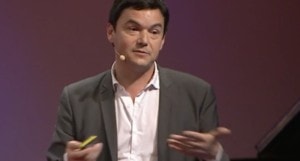In an interview with Trouw he describes the target as ‘realistic and ambitious’. In the first year of the project, 50,000 homes should be cut off from gas and the rate of transition ramped up in the following years. In addition, no more new homes should be connected to the gas network, Samsom says. In Amsterdam, for example, two new residential districts are being built without gas and some 70,000 homes in the city are already on district heating networks. Relatively new, well insulated homes can start running on heat pumps and electricity – preferably green energy from wind turbines and solar panels. For older districts that will often […]
Thursday, March 29th, 2018
MARTIN CIZMAR, - Raw Story
Stephan: French Economist Thomas Piketty, who captured international attention with Capital in the Twenty-First Century, has come out with a new work arguing basically for the Theorem of Wellbeing. This article and most of the rest I have seen couch his argument in liberal vs conservative politic terms which, I think, almost completely misses the point Piketty is making. He is arguing that Bernie Sanders idea, with which I am in complete agreement, that the function of state is to foster wellbeing is the way forward for the Democratic Party. Like myself, Piketty cares only about facts, so his arguments are based on social outcome data.
I hope the Democrats are listening.

French economist Thomas Piketty
Credit: Screenshot
Would Bernie Sanders have won? French economist Thomas Piketty seems to think so.
The author of Capital in the Twenty-First Century, a New York Times best-seller and the most-bought book in the history of Harvard University Press, has published a paper that uses exit polling data to argue that embracing economic populism would power the left toward huge electoral wins.
The paper is called “Brahmin Left vs. Merchant Right: Rising Inequality & the Changing Structure of Political Conflict” and it’s a book-length 174 pages with references and charts.
Piketty says that both parties now appeal to elites in America, with high-education elites liking the left, while wealthy elites support the right—though he points out that this is changing in the era of Trump, with polling showing that wealthy suburbs are now a danger zone for Republicans.
It’s dense stuff—not the sort of thing the “low education, low income voters” he writes about are likely to read:
“I argue that this structural evolution can contribute to explain rising inequality and the lack of democratic response […]
3 Comments
Thursday, March 29th, 2018
Dorotea Sotirovska and Elizabeth Philip , - VOX
Stephan: The other day I went to Costco, and sat at a table eating a turkey sandwich with a very stout middle age man who was eating several slices of pizza, an order of fries, and a brownie, all washed down with a coke. We had one of those superficial weather-centric conversations one has with strangers when silence would be rude. It made me think about the American diet. This story makes the point that came to me as I thought about that meeting.

Credit: VOX
The American plate has increasingly lacked nutritious food. This eating trend has serious consequences: There is a strong link between diets low in fruits and vegetables and obesity and diabetes.
One reason why Americans tend to choose less healthy options is simple: cost. Processed foods tend to have a lot more calories at a lower price; that’s more bang for your buck than fresh food if you’re on a budget.
Fresh fruits and veggies are more expensive to farm than crops that will be processed. Produce relies on human labor rather than machines, and machines are more efficient and cheaper in the long run. But the US government also doesn’t subsidize leafy vegetable crops in the same way it supports wheat, soy, and corn, vital ingredients in a lot of junk food.
Some programs in the United States are trying to steer consumers toward healthier options. Researchers are suggesting a junk food tax on “nonessential” foods like candy, soda, and potato chips as the next frontier in public health policy. Experts cite similar […]
No Comments
 Ashish Jha is a health care professor at Harvard. And there’s this thing he used to say when he gave talks, a thing he thought was definitely true about the American health care system.
Ashish Jha is a health care professor at Harvard. And there’s this thing he used to say when he gave talks, a thing he thought was definitely true about the American health care system.











